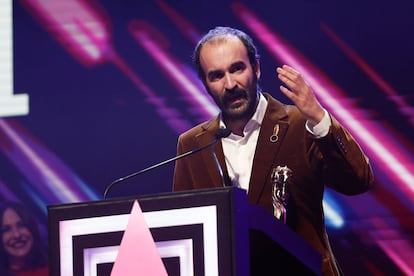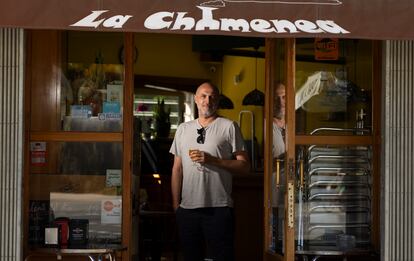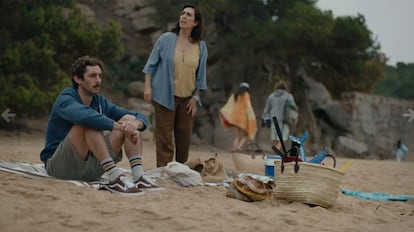A week ago, the Gaudí Awards gala fueled some embers that still burn in Catalonia, on account of the speech made by screenwriter Eduard alone when he picks up his award for the film House in flames and that has enervated the most fundamental or identity sectors of independence. Sola was “proudly Charnego” in his claim of social and cultural progress that mediates between his immigrant and illiterate grandfather and himself, in turn champion of the fight against xenophobia.
Director Juan Antonio Bayona seconded him in this “Charnego” 47by Marcel Barrena. This facilitated, in turn, that the actor Eduard Fernández, awarded for his interpretation of the neighborhood and militant leader of the PSUC and CC OO Manuel Vital in his epic as an immigrant and bus kidnapper, claim movies in original, Catalan and Castilian version, without dubbing Incidentally, he also cry out for the right to housing.
In the Catalonia that the socialist Salvador Illa governs in the minority appealing to the order and the return to normality after the processthe controversy fueled in social networks by the most identity Catalan nationalism, both related to junts and the extreme right of Aliança Catalan and from some sectors of the independence left, has risen the temperature almost to levels of the fires that have kept in suspense To Hollywood. It is no stranger that the controversy arose, broadcast on TV3, at the Acadèmia del Cinema Català gala that, since it was created in 2009 and until 2021, has been a showcase chaired by independence activists Joan Joan and Isona Passola.
Already without “available utopia”, which is like Marina Subirats defined the independence yearning in times of economic crisis, social cuts and ideological confusion, the sociologist says that “there are logically frustrated or bitter people who do not want to abandon the bankruptcy process and the confrontation. ” And that can be expressed “so much with the vote of Junts in Congress to knock the social shield and with samples of nationalism and hate the other or abroad” that, in the end, Subirats warns that they can end up combining “with utopia or Distopia today on the rise, which is that of Donald Trump and fascism. ”
Surprising, incomprehensible or tired, for some, and rabid opportunity for indignation, for others, the controversy about charneguismo, which the writer Najat el Hachmi considers “completely absurd”, it is a recurring cultural battlefield in Catalonia and coincides this time this time with the centenary of the birth of the writer Paco Candel. In your newly reissued The other Catalans (Edicions 62), Candel has already made clear 60 years that, assuming its use as affront, it is difficult to agree on the meaning of the term: “The dictionary says that a charnego is the mestizo of Catalan and French. Actually, Charnego means mestizo. And all Catalans are charnegos by little that they go back to their family tree. ”

The president of the Athenes Popular Memory, Angelina Puig, historian and author of the book Andalusia and Catalunya: dictatorship and emigration, He believes that “the use of the term Charnego by alone invalidated, in the eyes of some, what was a reflection and a beautiful claim about the role of education, associationism and public as making social cohesion.” However, in his opinion, it is not of receipt – and less by people of immigrant origin of second or third generation – to use a word “used as an insult to the Spanish speakers” and that today does not serve to describe any social phenomenon. “It is not a living concept; Today’s foreign immigrants are not comparable to those who came from the rest of Spain more than half a century ago, ”clarifies the demographer Andreu Domingo.
“Charnego is not synonymous with the working class either, because there was and there is a catalog,” Puig says. In the heat of controversy, the historian Andreu Mayayo, in an act of democratic memory held on Thursday at the Paraninfo of the University of Barcelona, wanted to highlight that “most immigrants not only contributed workforce, but also a political culture And very marked trade union, and the factories were the space where the reprisals, Catalans of origin and adoption, forged the new inclusive and vindictive popular Catalanism, overcoming residential segregation. ”
The president of the Ateneous People’s Memory and journalists such as Roger Palà and Ferran Houses, of the former in analyzing the controvers Critical y Digital was bornThey understand that the “class” meaning is what the screenwriter wanted to give his pride Charnego, perhaps without realizing that a Pandora box opened or that he gave ammunition to certain independence. As the philosopher Pau Luque has written in the country, it is the “relevant part of Catalan nationalism that loses oremus when she drinks cyanide of a very specific word: Charnego.” More conciliatory, Palà says that it is a concept that “challenges and can be interpreted in different ways, but that it is evident that it expresses a wound or an unappealable feeling for some people.”

The Marina Gay engineer, vice president of Òmnium Cultural and also of the Paco Candel Foundation, recognizes that in both entities they congratulated themselves for the speech of Solo. “It was very good to work cohesion; Only when we noticed the author to the author in the networks and began to receive requests so that we set a public position we realized that he perhaps had expressed himself badly, that he was misunderstood or that he has wanted to understand badly ”, Gay explains. “It was expected that the ultras followers of the deputy and mayor of Ripoll, Sílvia Orriols, seek to make blood,” also coincides with the director of Catesco (former Unesco Center of Catalonia) with the journalist Palà.
However, also exponents of more traditional conservative Catalanism have signed up for it. It is exemplified by the journalist Francesc Canosa when, in a column of the newspaper Segretalks about understanding “the business of charneguismo sl” as “an elite club that never closes” and that hides the history of the immigration of rural Catalonia to Barcelona, of “universal epic without validation for the dictatorship that gives cards of heroism. ”
Another sack flour are the internal contradictions uncovered by the controversy in the independence left, as well as the implications or nuances of the resignification of the charnego that flags sectors or intellectuals of the left not precisely sovereignist. The deputy of the Popular Unity candidacy (CUP) Laure Vega shared in her networks the “two minutes that are gold” of the speech of Solo, which described as “brutal” and as an example of “collective success.” Official name Laura Fernández Vega, daughter of trade unionist of the Baix Llobregat and immigrant family who of Andalusia said in Sant Boi (Barcelona) after passing through the Barracas de Can Tunis, where Candel also lived, the independence policy has received not a few criticisms of Some of his own colleagues for having praised alone.

“There are those who are always with the loaded weapon,” says anthropologist José Mansilla, born in 1974 in Seville and based in Barcelona for years. “The charnego concept of the speech of Solo has been oversized because since Illa governs and the processthere are those who take advantage of anything to imply that it can be reopened, ”explains who defines Marxist and supporter of the idea of a single people, They were champion Candel and the Catalan left.
Because of the way that identities are “social constructions that always have profits, even divisors”, Mansilla criticizes almost equally to those who from an identity nationalism only “appeal to the people when those who consider their own do not govern” and those who, unlike what that he did alone “by dismissal pride”, resignify the notion of charnego to an also identity or even political end.
Brigitte Vasallo, Barcelona writer of Galician family and emigrated in France and Morocco, is the maximum example of the resignificant commitment. In 2019, he was curator of the Txarnega Culture Festival that sponsored the Barcelona City Council of Ada Colau. “One thing we share many people who come from migratory processes is when, at school, someone tells you or makes you see that you will never be like us And that you will never speak Catalan as us”, Explains Vasallo.
Vasallo refers to his interviews in the digital ones Ctxt y Critical, where he acknowledges that his charneguism, as a living memory exercise, raises blisters in Catalonia and in Madrid: “The left say that thing that this divides the working class. I don’t understand how we can continue to fall into that trap. ” VASALLO JUDGMENT: “I do not want repair or ask me for forgiveness, I want, from the poetic, revenge.”
In the debate on charneguismo underlies both “the false simplism of those who identify immigration with labor and catalyst with burgesia”, according to the vice president of Òmnium, and “the imposture of the one who tries to resurrect a concept expired as a political project or collective identity” because not The substantive problem is faced that is “the loss of class consciousness,” says Andreu Domingo in tune with Mansilla. And here they fit from “Choni fashion or dog”, According to the demographer, to which Vasallo represents, or the portrait about alone, Bayona and Fernández that the anthropologist imagines summarized in the internal jurisdiction of the independentistas Joel Joan and Isona Passola:“ These people are us, but they are not from ours”.
In 47something similar tells a Francoist to a neighbor of Torre Baró, but with the opposite effect. Because, unlike what the screenwriter suffers today House in flamesthe controversy in the seventy Catalonia that the Barrena movie portrays was then settled thanks to the idea of a single village who defended in workers commissions, the PSUC, the neighborhood associations and the Assembly of Catalonia people like Manolo Vital and Paco Candel. “For some, everyone who lives in Catalonia is charnego and is not Catalan or speaks the Catalan language,” says the writer in The other Catalans. But the entire book makes clear, with a class pride and national, which is Catalan who lives and works in Catalonia.

